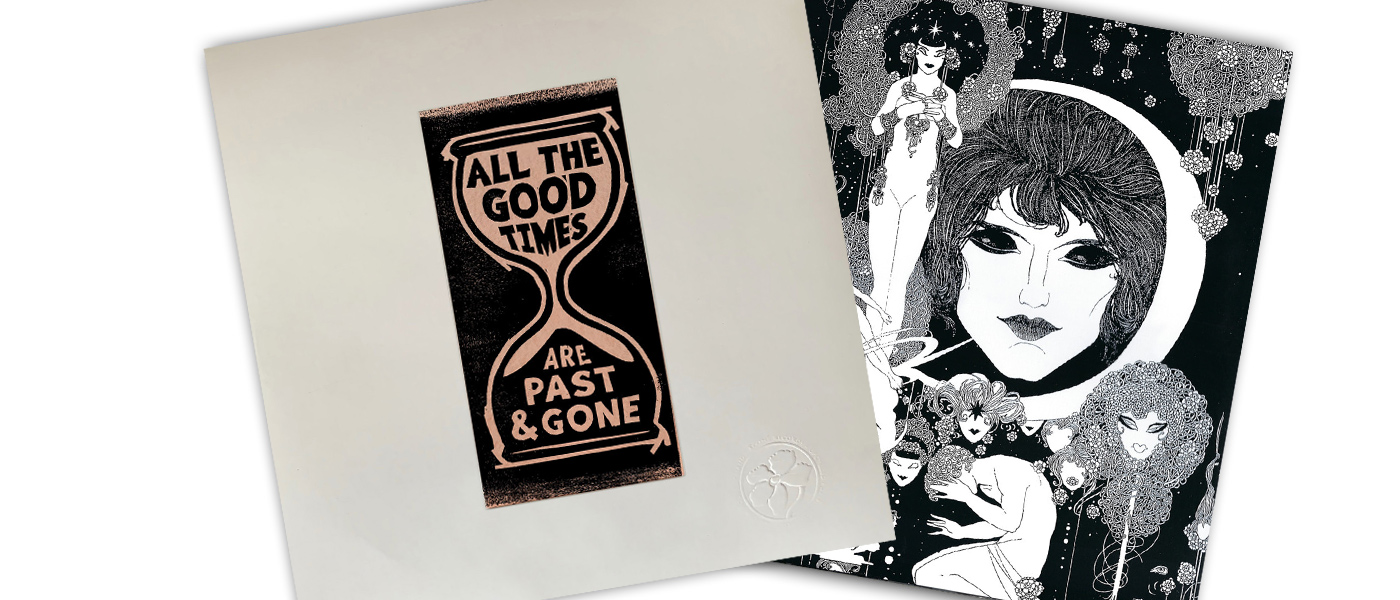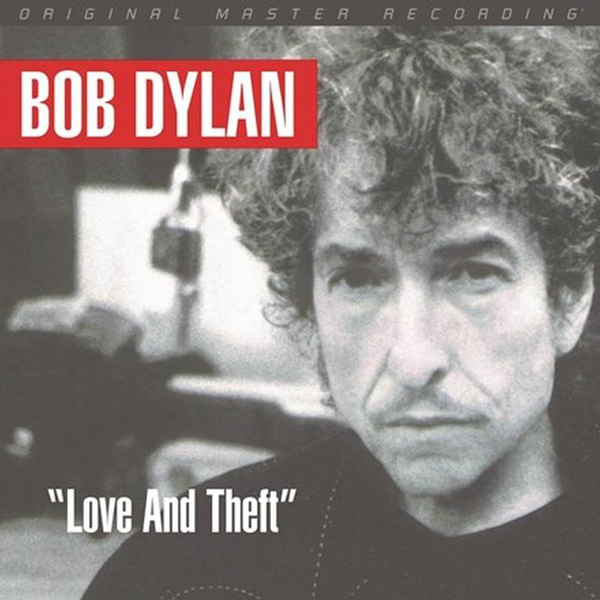
It seems like Mobile Fidelity announced their reissue of Bob Dylan’s Love and Theft about 20 years ago, but it was probably more like two. I swear I think I’ve been looking forward to this release for at least that long, probably longer. It would be so nice if the company’s transparency regarding release dates approached the level of sonic transparency that makes their titles so special. (Like everything related to audio, people will debate that last point until all parties turn blue and drop off. I believe that their “sonic signature” is much less evident than it used to be. Fire away if you think otherwise.) Anyway, Love and Theft is a classic. Full stop. That’s what it is, and that’s what it will be. MoFi spread their version out over two discs cut at 45 rpm. It’s the best thing to happen to me in months.
I saw this outfit play at Madison Square Garden (minus Augie Meyers) exactly 14 months to the day after Love and Theft‘s release (September 11, 2001). Nothing was going on but rocking at that show. Trust me on this one. Having Larry Campbell and Charlie Sexton handling guitar duties in a single band is almost criminal. Save some for the rest of us. They don’t, though. Listen to them workout on “Summer Days” if you don’t believe me. Dylan’s own production work lends the album a vintage flare, vintage-like the 1920s, so the sounds don’t come blazing out of your speakers despite the fire in the players’ fingers. It’s a refined listen except for Dylan’s voice, which is akin to sandpaper on the tender spot of your favorite callous.
“High Water (For Charley Patton)” is my personal favorite on the record, and the studio version found here only served as a skeleton for his live band to add muscle, and heart, and blood to. (A prime example can be found on the Tell-Tale Signs box from 2008. Mercy!) Love and Theft, at times, seem like Dylan just needed a vehicle to carry his one-liners in, and none of those top “I got a cravin’ need for blazing speed / Got a hopped-up Mustang Ford / Jump into the wagon, love / Throw your panties overboard.” We’re a bit thin-skinned in 2020; it’s tough to know what we’re allowed to laugh at and what will offend, but that was funny in 2001, and it’s never gotten old to my ears. If you can’t take that kind of heat… then I don’t know what to tell you. Maybe check out the Blossom Dearie record that we’ll get to later.
From a sound perspective, the MoFi version beats the original in every way. The original was cut a bit “hotter,” but there are sibilance issues to contend with at times along with a general overly bright effect that is not in evidence on this reissue. The high end is harsher on the original, and much more balanced on the MoFi take. All of the sounds on the MoFi set are more defined and precise than on the original, and the pressing itself, while not visually impressive, is dead silent allowing the notes to decay in front of your very ears. I took pictures of mine and sent them out immediately to those in the know. It’s been a long time coming, and I barely got in under the wire. Most outlets sold out and are awaiting repress. I got mine from an indy store in Cincinnati called Plaid Room Records. Maybe you can too. If not, a repress is already in the works. Good luck!

There’s a hard liquor drinking establishment in San Francisco that has a bunch of musicians painted on tombstones above the bar. All of the honorees are deceased except one: Shane MacGowan. He is presumably still alive. Or whatever counts for “alive” in his world. I once worked with a gentleman who worked on the Pogues’ road crew. He said the band was all set to begin a tour in the late ’80s or early ’90s, and that MacGowan, the band’s lead singer, was nowhere to be found just before tipoff. There was a last-minute scramble to locate him, which led to an opium den in Singapore. He was extricated and made the first show on the other side of the planet two days later. It could be apocryphal, but it makes for the best story, so I’m entirely on board.
This year’s Record Store Day has been spread out over three events, the first having transpired on August 29. My local vendor was still shuddered due to COVID so they released their titles online. Except that their website crashed immediately upon sales going live. No matter, I found another indy vendor for my Pogues fix, and they sent me out a copy of the Pogues’ BBC Sessions 1984-1985, which compiles performances from four shows from the era. This predates the Opium Den Heist, almost certainly. It doesn’t predate the band’s ability to churn out some gutty performances of their brand of Irish Folk Rock, though. Not by a longshot.
I first learned of the Pogues around the age of 14. My best friend’s oldest brother had some of their stuff, and we thought we were on the cutting edge of… something by blasting their music from our cars and at parties. High school parties. In the early ’90s. You can imagine how that went over. Sort of like a whiskey filled soccer ball on thin ice. No one wanted to get too near it. They just left it for us to deal with.
Secrets Sponsor
To call this “drinking music” would be like getting COVID “a little inconvenient.” I mean, it seems to be designed for the activity. Live footage confirms that it happened a lot at the band’s shows. Onstage and off. It’s not necessary to enjoy the music, though. I was surprised by the players’ technical skills and the command of their instruments. Especially this early in the game. (The eldest recordings were made while the band was still called “Pogue Mahone,” and they predate what I consider to be the Pogues’ high water/whiskey mark, 1988’s If I Should Fall From Grace With God.) The band was a sextet at this point and still included Cate O’Riordan on bass. She’d soon come to her senses, divorce the Pogues, and marry Elvis Costello. The players function as a tightly wound machine, hitting on all cylinders, and paving a way into the future of Pop music that must have seemed as unlikely at the time as American politics seem now. “Some get stoned, some get strange,” as the old song says.
These performances fit on a single well-pressed disc courtesy of Optimal Media (one of my fave pressing plants). They were likely recorded in small studios in front of sparse audiences, and the lack of polish and shine make them all the more immediate and endearing. 5,000 were made. It’s been a bit easier to procure these limited titles online than in years past, and this one is highly recommended. Try it sober first. I promise it holds up.
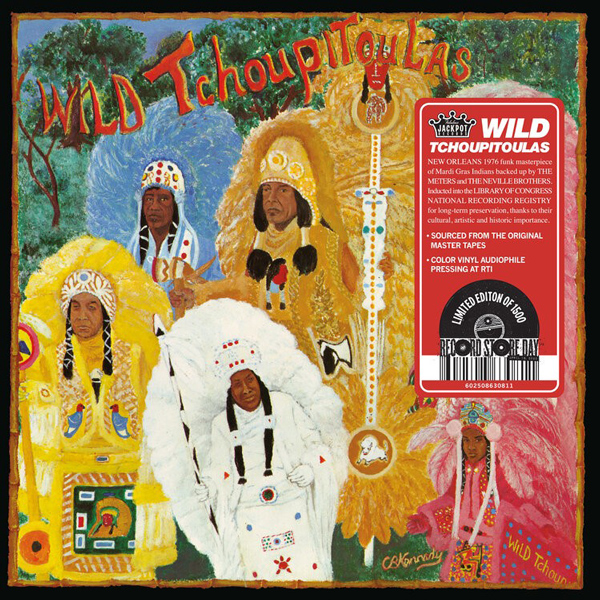
I keep thinking of breaking my vinyl collection out into genres. Keep thinking I’d like to have my Jazz and Hip-Hop records, at least, off to themselves. But there’s one style of music that absolutely screams out for its own section, preferably without any nearby neighbors so that the discs can get up and groove around with impunity. That would be the New Orleans section. That’s the only cubby wherein a wild man like Bobby Charles can live next to an institution as venerable as Louis Armstrong and have it all make sense. My NOLA section is not as robust as I’d like. Dr. John is well-represented. Duh. I’ve got a single Armstrong entry too. Some Meters, some Soul Jazz comps that are dedicated to the city, a Betty Harris best-of. An original Sweet Emma and Her Preservation Hall Jazz Band. A collab between a later version of Prez Hall with Del McCoury, and… whatever I’m forgetting. Not much else, though. There’s work to be done.
There’s an art to sifting through the bazillion Record Store Day releases to find what’s worth having. The event had a reputation for foisting rushed productions out into the market with pressing defects and generally below-the-bar offerings, but that seems to have abated a bit in recent years. Every once in a while, you’ll see something with Kevin Gray’s name attached to it, or you’ll find a AAA production to track down. There wasn’t a ton on the August list that I wanted (and nothing from September!), but the Pogues thing was a win, as was the latest entry into my fledgling NOLA collection: the eponymous debut from the Wild Tchoupitoulas. Oh, baby. This one was “sourced from the original master tapes,” but not cut from them. It was likely mastered from a high-rez file, I’d imagine. It was a “First Release,” so there will be a wider distribution soon, possibly on standard black vinyl as opposed to the sky blue RSD version, of which only 1,500 were made. (The disc matches Trail Chief’s Mardi Gras get-up on the back cover. Kinda cool.) This one seems to have flown under the radar, and that’s too bad.
But not for me. Everyone needs this in their collection, whether they know it or not.
That’s because we’re all in need of some good-time music in 2020, right? And I’m not sure how much more fun music can get. This is celebratory music. Music to rub up against people to (if that were allowed). It’s the kind of music that makes seclusion and isolation incredibly difficult because this is an album you want to share with your friends. Listening alone is like using a record for a dinner plate. It can be done, but it’s painful.
Wild Tchoupitoulas starts with voices and handclaps, then a bit of tambourine. Some more percussion seeps in, then the party begins. We got bass. Then, we got call and response vocals. We got syncopation’s mother in our back pockets. And, above all else, we have the Meters as the backbone to the whole ordeal. The record works as a historical document too because it’s the first time that Uncle Big Chief Jolly wrangled his nephews into a studio together so that they could add harmony vocals to the proceedings. They would go on to be known as the Neville Brothers. The lyrics are printed on the inner sleeve and may seem nonsensical to those who aren’t in the know, but it’s fun to review them and to realize that they really were saying “Jock-a-mo feena” all that time.
This one was pressed at RTI, and my copy is remarkably silent and flat. It’s by Jackpot Records, the same folks that gifted us a mono reissue of Dr. John’s Gris-Gris a while back. They’re worth keeping an eye on, and Wild Tchoupitoulas is worth grabbing when that wider release rolls out if you whiffed on the RSD version. It’s so great.
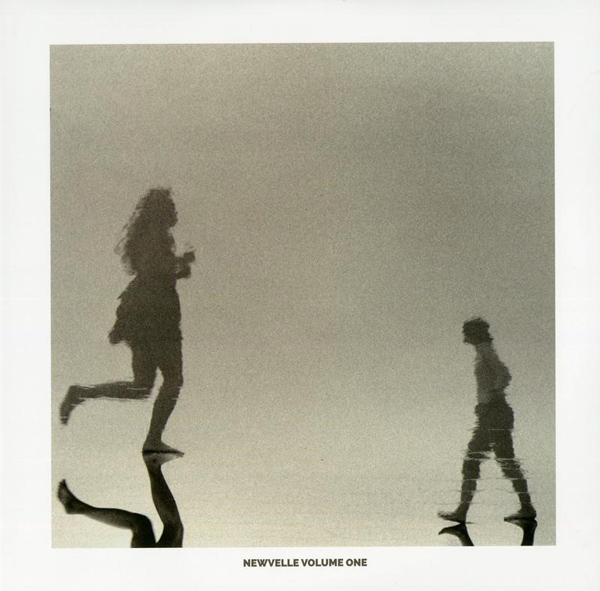
Newvelle Records, a vinyl subscription service with a different slant, often breaks open their box sets on RSD to sell individual titles as a sort of one-off annual event. This year, they did something different. They pressed a single-disc sampler containing material from Newvelle’s first three “seasons.” The (new) sampler was pressed at QRP. The (older) seasons were pressed at MPO. I’ve had pretty good luck with MPO, in general, but the word on their work with Newvelle was often of the four-letter variety. People were unimpressed, especially after having paid $400 for a season’s worth of noisy records. It makes one wonder if Newvelle is circling back to present some of their earlier work in a more flattering light. Newvelle Volume One is a lovely collection that points to a larger issue.
Let’s address that problem first: it’s not uncommon for vinyl enthusiasts to spend long months salivating over upcoming vinyl reissues or releases to find that… the job got botched. It happened on a RSD a few years back to me. I was anxiously awaiting Vic Chestnut’s West of Rome only to be defeated and deflated by a noisy, unlistenable pressing. Once that happens, who knows how long it will be until a reputable company comes along to try their hand at it? If the crappy reissue doesn’t sell, will anyone ever bother to even try again? Making a high-quality vinyl record mustn’t be easy, but it’s clearly possible. Just get it right. Do it right the first time and every time to the best of your ability. United Record Pressing, purveyors of defective West of Rome reissues, and many others have ceased to even put their branding stamp in the dead wax, as I understand it. No word yet on whether they’ve actually begun to make good records and wanted a clean break from their past or if they simply want to conceal their work.
Secrets Sponsor
Anyway, Newvelle Volume One sounded barely above United’s quality control standards upon the first spin, but a thorough scrubbing brought the disc up to par. To be clear, a regular round on the cleaning machine was not adequate. Elbow grease and multiple passes were required. The results were worth the effort. And that’s great news because the material is pretty phenomenal. I came for “Aziza” by Lionel Loueke (guitar) and Kevin Hays (piano). I caught Loueke onstage with Herbie Hancock last year and was appropriately blown out of my seat. (He has a solo album of Hancock covers en route. Excite!) “Aziza” involves precious little sustain in either player’s attack. The notes sort of pelt you like rain until the last second resolve when some of the piano notes fade to black.
Or fade to clear in this instance. Newvelle’s records are literally transparent; they use no dye in their vinyl formula. It’s like a window into the world of modern jazz masters. (Seems like something their marketing team could run with, no?) Volume One is a reverential listen due to the skill on display and the emotional responses that result. Like the Kenny Werner record we explored here a few months back, it rewards multiple focused listens. This is not background music; the performances demand our full consideration. Having a host of new Jazz recordings that you might not otherwise have found on a single, well-made disc is a gift. And there are surprises throughout. Rufus Reid, for example, employs a string quartet to flesh out “This I Ask Of You,” and you could almost rest your weary head on the waves the players create. You’ll want to know who’s doing what, but the included liners are a little thin, so you’ll need online access to get to the more detailed info that resides at Newvelle’s site. The album is still available, and it’s a fine opportunity to explore what Newvelle does without committing to a full season. Glad they circled back to save these tunes.
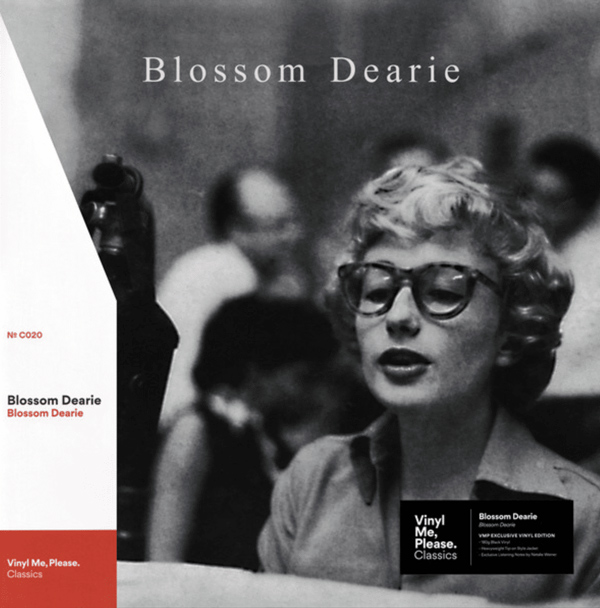
Blossom Dearie. There’s a name for you. Right? The woman tasked with carrying that handle through life was born in 1924 and released her first album for Verve in’ 57. That’s why we’re here. Vinyl Me, Please released her self-titled debut as their Classics selection in January of last year. The release sort of exemplifies one of the things that VMP does best: to turn people on to recordings that they might have otherwise missed. They have pretty good taste, at least as far as their Classics go, and this record, according to the online forums, seems to be a real winner with their customer base.
Blossom Dearie is made of Dearie’s girly giggle of a voice and her piano atop a small combo consisting of guitar, double bass, and drums. There are occasional appearances by a chorus of background singers, but it’s best to overlook that. The smaller combo is where it’s at—all the way. A quick look at what passed for popular music in 1957 suggests that this album might not have sounded as dated as I’d initially thought it would. Yeah, All Shook Up and Great Balls of Fire were all the rage, but Perry Como had some hits that year as did Nat King Cole. Hell, Jimmy Dorsey had one with So Rare. I’d say Ms. Dearie could have crashed that party if she’d asserted herself, but it doesn’t appear that she did. The most recognizable song to my ears is Lover Man (Oh Where Can You Be), which was popularized by Billie Holliday 12 years before Dearie got ahold of it.
This record will make you feel all fuzzy. It’s difficult to avoid toe-tapping and smiling vaguely into space while listening. A craft cocktail might be in order. An aviation, perhaps. Or some type of martini. You’ll be whisked back to an era when men politely approached women and asked them to dance as opposed to, you know, whatever the hell it is we have now that passes for manners. Kevin Gray himself remastered this release for VMP from unknown sources. A booklet of “listening notes” is included, and the vinyl was pressed (well) at GZ. I swear that the vinyl industry stands a good chance of profiting from VMP’s quality control standards if folks would take notice. They seem to get the best pressings out of whatever facility they use, and that is never more evident than when you get one of their titles from GZ, a facility I’d normally avoid, but one that I buy from with confidence on VMP’s site. I wish I knew how they did it, and I wish the other companies would follow their lead. You might not get a flawless copy on the first try, but their customer service agents will work with you until they get it right.
You have to be tuned into what VMP has going on in any given month, though. Records are announced, sell out, are restocked without warning, then disappear again. This one made a recent comeback. I got online to order another copy as a gift, and… nothing. Sold out. It’ll be back, though. And when it comes around, one should be prepared to pounce with a martini close by.


